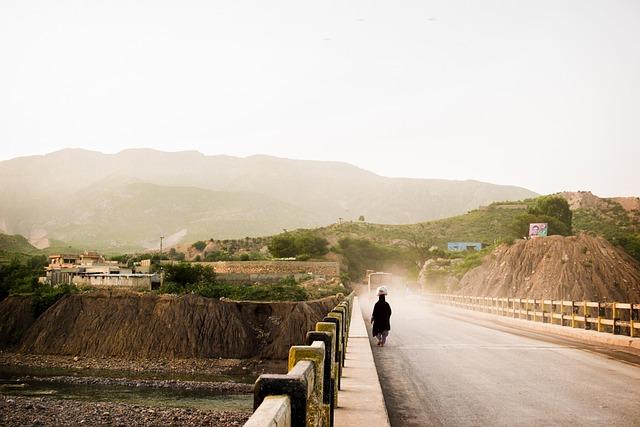In the heart of South Asia, where the ancient peaks of the Himalayas cradle millennia of history, a contemporary struggle unfolds that pulses with urgency and complexity. Pakistan, a nation forged through resilience and rich in cultural tapestry, finds itself navigating the shadows of extremism—a battle that echoes through its cities, villages, and the very fabric of its society. This ongoing conflict is not merely a tale of violence and terror; it reflects deep-rooted socio-political undercurrents, historical grievances, and the relentless quest for national identity. As the country grapples with the multifaceted challenges posed by extremist ideologies, the path forward remains fraught with uncertainty yet layered with the potential for renewal. This article delves into the intricate dynamics of Pakistan’s struggle against extremism, illuminating the voices of those who strive for peace amidst the chaos and examining the broader implications for a region yearning for stability and hope.
Understanding the Roots of Extremism in Pakistan
The complex tapestry of extremism in Pakistan is woven from various historical, socio-political, and economic threads. At the heart of this issue lies a combination of political instability, economic disparity, and educational shortcomings that creates fertile ground for extremist ideologies to take root. Socio-economic challenges, including high unemployment rates and poverty, often lead young people to seek belonging and purpose in radical groups. Furthermore, the legacy of conflict, particularly the Afghan war in the 1980s and the rise of militant organizations, has left deep scars on the national psyche, perpetuating a cycle of violence and retaliation that continues to shape contemporary narratives.
Moreover, the role of religious extremism cannot be overlooked, as it often intertwines with political agendas to fuel discontent and radicalization. Various factors contribute to the proliferation of such ideologies, including sectarian divisions, madrassa education, and a lack of secular alternatives. The intertwining of these elements has culminated in an environment ripe for the emergence of extremist groups that exploit societal grievances for their gain. To understand the roots of extremism, one must also consider the global context, where narratives of injustice and persecution resonate with local struggles, drawing disillusioned individuals toward radical solutions.

The Role of Education in Countering Violent Ideologies
Education serves as a powerful antidote to the allure of extremism, offering individuals the critical thinking skills and contextual awareness necessary to challenge violent narratives. By fostering a culture of inquiry and open discussion, educational institutions can dismantle the myths propagated by extremist groups. The inclusion of curricula that emphasize critical thinking, ethical reasoning, and social cohesion not only equips students with knowledge but also empowers them to recognize and question fallacies and manipulations within ideological frameworks. Here are some essential components:
- Inclusive Curriculum: Programs that celebrate cultural diversity and promote social justice.
- Critical Literacy: Training students to analyze and critique various forms of media and propaganda.
- Conflict Resolution:** Tools to handle disagreements peacefully and constructively.
Moreover, formal education combined with community-based initiatives can provide alternative pathways for youth, steering them away from extremist beliefs. Engaging parents and local leaders in discussions about the significance of peace and mutual respect can reinforce the message delivered within schools. Access to vocational training and mentorship programs can also redirect the aspirations of young people toward constructive goals rather than destructive ideologies. A collaborative effort in education can create a resilient society capable of standing firm against the tide of extremism. Below is a simple table that illustrates key educational strategies:
| Strategy | Description |
|---|---|
| Community Education | Workshops and discussions aimed at improving community awareness. |
| Mental Health Support | Programs that address psychological well-being and resilience. |
| Peer Counseling | Encouraging open dialogue between students regarding their views and experiences. |

Strengthening Community Resilience Through Engagement
At the heart of combating extremism lies the empowerment of local communities, fostering an inclusive environment where every voice is valued. Building robust connections among residents is essential for creating a united front against radical ideologies. Engagement initiatives can encompass a range of activities designed to promote dialogue, enhance trust, and facilitate collaboration. These may include:
- Community workshops that focus on conflict resolution and peace-building techniques.
- Youth mentorship programs aimed at channeling the energies of young people into productive and positive endeavors.
- Cultural festivals celebrating diversity and strengthening community ties.
Moreover, tangible resources, such as local support networks and educational opportunities, play a pivotal role in strengthening resilience. A systematic approach encourages participation and ownership among community members. A survey conducted in various regions showcases the impact of community-led initiatives on reducing susceptibility to extremist recruitment:
| Community Initiative | Impact on Extremism |
|---|---|
| Youth Engagement Programs | Reduced radicalization interest by 40% |
| Support Networks for Families | Increased reporting of suspicious activities by 30% |
| Cultural Exchange Events | Strengthened inter-ethnic relations, lowering conflict incidence by 25% |

Policy Recommendations for a Sustainable Peace Effort
To cultivate a sustainable peace in Pakistan, it is imperative to adopt a multifaceted approach that addresses the root causes of extremism while fostering social cohesion. Education remains a cornerstone of this strategy; by investing in quality education that promotes critical thinking and tolerance, we can disarm the ideologies that fuel extremism. Furthermore, community engagement initiatives must be developed to strengthen ties among diverse social groups, encouraging dialogue and mutual understanding. Specific recommendations include:
- Curriculum Reforms: Update educational materials to include teachings of peace, resilience, and tolerance.
- Empower Local Leaders: Facilitate training programs for community leaders to mediate conflicts and promote harmony.
- Support Mental Health: Increase access to mental health services to help individuals cope with social injustices and trauma.
Additionally, governmental and non-governmental organizations should collaborate to create targeted economic opportunities in regions vulnerable to extremism. By addressing unemployment and poverty, we can mitigate the appeal of extremist narratives. Aim for inclusive development that considers the nuances of local contexts. Proposals to enhance economic stability could include:
| Initiative | Description |
|---|---|
| Skill Development Programs | Launch vocational training centers to equip youth with marketable skills. |
| Microfinance Schemes | Provide small loans to entrepreneurs in underserved communities. |
| Infrastructure Investment | Improve local infrastructure to enhance connectivity and access to markets. |
The Way Forward
In the intricate tapestry of Pakistan’s struggle against extremism, each thread represents the resilience of a nation steadfast in its pursuit of peace. As we peel back the layers of this multifaceted issue, we uncover a complex interplay of history, ideology, and human experience that defines the country’s ongoing battle. The shadows may loom large, yet within them glimmers the enduring spirit of countless individuals and communities striving for harmony.
This journey of navigating the shadows is far from over. As policymakers, activists, and citizens unite in their resolve, the path ahead may still be fraught with challenges. However, the ongoing dialogue and collective action symbolize a crucial step toward illumination and understanding. It is a testament to the adage that only when we confront the darkness can we truly begin to appreciate the light.
As we conclude our exploration, let us remain vigilant and hopeful. The narrative of Pakistan is not solely one of conflict; it is also a story of potential, change, and the unwavering desire for a better tomorrow. By continually engaging with these critical issues, we contribute to a broader discourse that promotes peace, understanding, and resilience in the face of adversity. In this intertwined narrative of struggle and resilience, we all have a role to play in shaping a future free from the specters of extremism.



